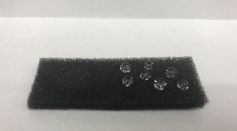ENVIRONMENT & CLIMATE

Ancient Footprints Tell a Story of a Parent and Child Making a Daring Journey
Raccoon Captured After Attacking Young Child and Tested Positive for Rabies

Eco-Friendly Methods to Clean Oil Spills
Indian Capital Suffers Thick Smog Once Again Due to Agricultural Fires
Critically Endangered Hainan Gibbon Uses Man-Made Rope Bridge for the First Time

Amazon Deforestation Could Breed Brand New Diseases for the Next Pandemic

Charity Lady Freethinker Uncovers Horrific Dog Meat Auction House in South Korea
New Study Suggests That Monkeys Self-Domesticated
Authorities Explain How Climate Change is Causing Drought and Colder Winters
Nature's Giants: 5 of the Tallest Trees in the World
Glitters on Makeup and Dresses Are Damaging Freshwater Habitats

Tackling the Animal Problem in Cuba: Government To Pass First Animal Protection Law

Cows Prefer Face-To-Face Chat Over Pre-Recorded Voices, Says Study

Lasers Can Now Measure Biomass in Giant Redwoods
Most Popular

Radiation Explained: How It Works, Its Risks, and When Exposure Becomes Dangerous

'Forever Chemicals' PFNA and PFOSA to Faster Biological Aging in Middle-Aged Men, Study Finds

PETA Condemns Viral Baby Monkey Punch's Zoo Conditions As IKEA's Stuffed Orangutan Toy Sells Out

Understanding DNA Structure: How Life Stores Its Code—and Why Genetic Mutations Happen





